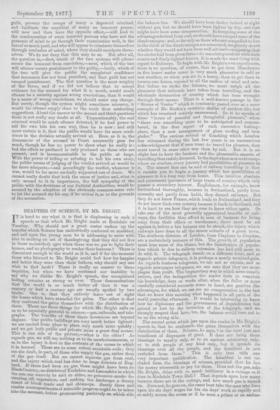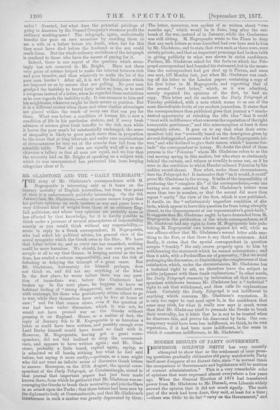BEAUTIES OF SCIENCE, BY MR. BRIGHT.
IT is hard to say what it is that is displeasing in such a speech as that which Mr. Bright made at Rochdale on Tuesday. Why should not a great orator reckon up the benefits which Science has undoubtedly conferred on mankind, and call upon the young men he is addressing to unite with him in making an act of thanksgiving that they did not live in those melancholy ages when there was no gas to light their houses, and no photography to render their features ? There is discontent enough in the world as it is, and if for the moment those who listened to Mr. Bright could feel how far happier and better they were than their 'fathers, why should any one wish to find fault ? There is really no answer to these inquiries, but when we have confessed our inability to say why we dislike Mr. Bright's speech, the unexplained feeling remains as strong as ever. These demonstrations that the world is so much better off than it was a century or half a century ago are usually spoiled by two faults. One is, that they entirely leave out of sight the losses which have attended the gains. The other is that they confound the gains themselves with the distribution of them. There are three things for which Mr. Bright calls on us to be especially grateful to science,—gas, railroads, and tele- graphs. The benefits of these three inventions are beyond dispute. Our public buildings are very much bettor lighted ; we are carried from place to place very much more quickly ; and we get both public and private news a great deal sooner. This is one side of the picture,—what is the other? As regards gas, we will say nothing as to its unwholesomeness, or as to the injury it does to the contents of the rooms in which it is burned. These are to some extent avoidable evils ; they are the fault, in part, of those who supply the gas, rather than of the gas itself. But we cannot separate gas from coal, and the injury which coal has done to large districts of Eng- land. If there had been no gas, there might have been no Black Country, no districts of Yorkshire and Lancashire in which the sun can scarcely be said to shine, no poisonous smoke de- stroying all vegetation, and making the landscape a dreary desert of black roads and tall chimneys. Surely these and similar accompaniments of scientific progress ought to be taken into the account, before pronouncing positively on which side the balance lies. We should have boon darker indeed at night without gas, but we should have been lighter by day, and that might have been some compensation. In foregoing some of the advantages derived from coal, we should have escaped some of the disadvantages; and, so far only as those who are compelled to live in the thick of the disadvantages are concerned, we greatly doubt whether they would not have been well advised—supposing that the choice had been given them—in remaining content with dark streets and dimly-lighted houses. It is much the same thing with regard to Railways. To begin with Mr. Bright's own experiences, there is no question, of course, that to got from Manchester in five hours under cover is very much pleasanter in cold or wet weather, or when you are in a hurry, than to got there in twenty-ono hours, exposed to all the malice of wind and rain. But before we strike the balance, we must weigh all the pleasures that railroads have taken from travelling, and the wholesale destruction of country which has been wrought through their means. There is a well-known passage in the " Stones of Venice" which is constantly passed over as a mere example of Mr. Ruskin's eccentric dislike of modern life, but which has remained entirely unanswered. In it he speaks of those "hours of peaceful and thoughtful pleasure," when "there was something more to be anticipated and remem- bered, in the first aspect of each successive halting. place, than a new arrangement of glass roofing and iron girder." The curious revival of Coaching which London has witnessed during the last few years is an unconscious acknowledgment that if men want to travel for pleasure, they must travel in some other way than by rail. But it is no slight loss to have the business and the pleasurable aspects of travelling thus rudely divorced. lathe days when men went every- where on coaches, every journey had possibilities of pleasure in it. The utmost that can be said of railway travelling is that it enables you to begin a journey which has possibilities of pleasure in it a long way from home. This involves absolute and permanent ignorance of large tracts of country which only possess a secondary interest. Englishmen, for example, know Switzerland thoroughly, because in Switzerland, partly from necessity and partly from habit, they discard railways. But they do not know France, which leads to Switzerland, and they do not know their own country because it leads to Scotland, and it is hard to see how they are ever to know either again. Or take one of the most generally appreciated benefits of rail- ways, the facilities they afford to men of business for living away from their offices or warehouses ; there must be set against it, before a fair balance can be struck, the injury which railways have done to all the nearer suburbs of a great town. The southern districts of London, from Clapham to Croydon, are a melancholy instance of this. The growth of population must boar some of the blame, but the distribution of popula- tion which is due to railway extension has had still more to do with it. The telegraph stands on a different level, and as regards private telegrams, it is perhaps a nearly unmixed gain. As regards business telegrams, We arc not so certain, and as regards newspaper telegrams, we are sure that they are more plague than profit. The fragmentary way in which news usually arrives, and the indisposition the reader feels to complete his knowledge, days or weeks after, when the fuller or more carefully considered accounts come to hand, are positive dis- advantages, for which we can see no compensation in the fact that we knew this morning what happened in all parts of the world yesterday afternoon. It would be interesting to know how far diplomacy and the government of dependencies has gained or lost by the invention of the telegraph, and we strongly suspect that here, too, the balance would turn out to be on the wrong side. The second point which jars upon the reader in Mr. Bright's speech is, that he confounds the gains themselves with the distribution of them. Science, he says, "is the most just and beneficent of dispensers of good. It does not bring these blessings to royalty only, or to an ancient aristocracy only,
or to rich people of any kind only, but it spreads its blessings over all the people, and the humblest is not excluded from them." This is only true with one very important qualification. The humblest is not ex- cluded from the blessings of science, provided that he has
the money wherewith to pay for them. Does not the gas, asks
Mr. Bright, shine with as much brilliancy in a cottage as it does in Rochdale Town Hall ? That depends upon how many burners there are in the cottage, and how much gas is turned on. Does not, he goes on, the same boat take the man who lives upon his six days' wages for his six days' work as rapidly and as safely across the ocean as if he were a prince or an ambas- sador ? Granted, but what does the potential privilege of going to America by the Cunard Company's steamers profit the ordinary working-man ? The telegraph, again, undoubtedly benefits the poor on rare occasions by enabling them to see a wife or a father before his death, when but for this they must have died before the husband or the son could reach them. But the whole ordinary usefulness of the telegraph is confined to those who have the means of paying for it.
Indeed, there is one aspect of the question which seem- ingly has not occurred to Mr. Bright. Have not these very gains of science helped to make the interval between rich and poor broader, and thus relatively to make the lot of the poor man harder ? After all, it is not the limitations which are imposed on us by nature that are galling. No poor man grudged the inability to travel forty miles an hour, or to send a telegram instead of a letter, when he regarded these restrictions as he now regards the inability. to fiy. It was common to him and his neighbours, whatever might be their means or position. But it is a different matter when these and other similar advantages are placed within the reach of every one that can pay for them. What was before a condition of human life is now a condition of life in his particular station, and if every fresh advance of science gives fresh benefits to the rich man while it leaves the poor man's lot substantially unchanged, the sense of inequality is likely to grow much more than in proportion to the sense that at long intervals and under rare combinations of circumstances he may eat of the crumbs that fall from the scientific table. That all men are equally well off is as mis- chievous a fallacy as that all men are equal, and we fear that the necessity laid on Mr. Bright of speaking on a subject with which he was unacquainted has prevented him from keeping altogether clear of it.



































 Previous page
Previous page